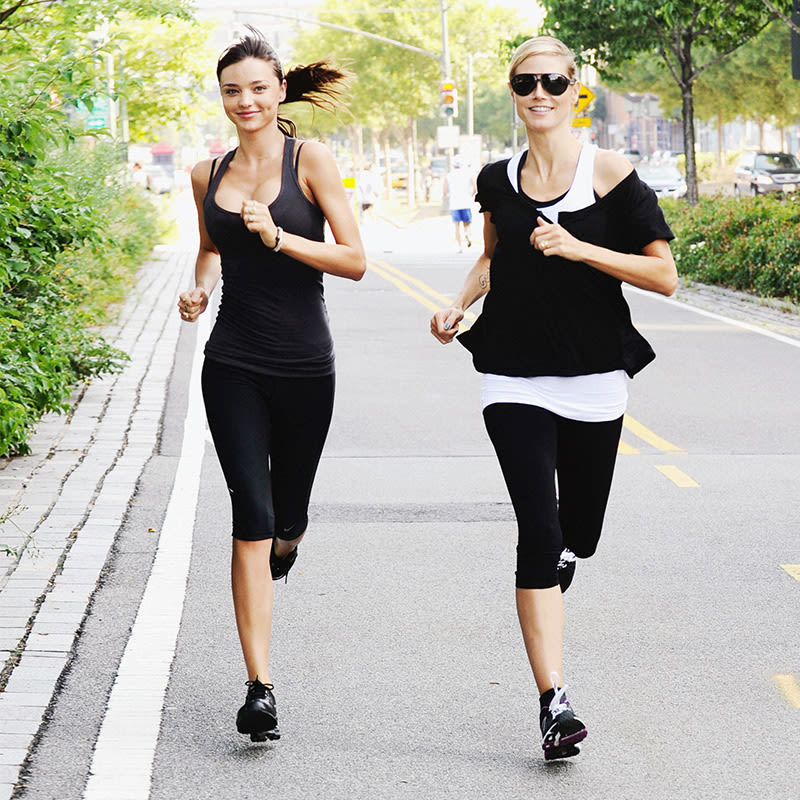To date, I have tried to become “a runner” at three distinct points in my time on Earth. This spring marks the fourth. All previous attempts have been disasters. When I was 15, my best frenemy resolved to run a marathon. “My grandmother ran marathons,” I told her, which was true. “It’s in my blood,” I asserted, which was not.
She was taller than me and had thicker hair. She also had a greasy boyfriend and a tiny Louis Vuitton bag that I was sure hid the secrets of womanhood within it. I wanted in. “Let’s be running partners,” she suggested. “Totally!” I enthused.
We went downstairs and ran a few laps around my high school gym. Within minutes, I knew I would need to amputate my legs. “That was so fun!” I said. When she tried to resume the Greek torture the next day, I told her I wanted to become a yoga instructor, which was true. Or, it would be. Someday, probably.
When I was 18, I moved across the globe to spend nine months in culinary school. It was delectable. During long evenings while I braised, I browsed critical news outlets to keep up with important national affairs. I read a lot of Teen Vogue. At the magazine, Laurel Pantin had started to train for a half marathon, tracking her progress on the site. Like her, I had curly hair, too, and really liked to eat peanut butter and bananas on toast, which she often whipped up for a quick “power breakfast.” As she crossed the finish line in a lot of Nike paraphernalia, she looked elated and muscled. Inspired, I jogged for 15 minutes around my neighborhood. For two weeks, I ran in concentric circles. Then, I tripped over a tree stump. A month later, I took up spinning. I wondered from time to time whether Laurel Pantin would have joined the class I attended.
During my freshman year of college, I gave it a third go. I had picked up a slim volume called What I Talk About When I Talk About Running at the university bookstore. It was a memoir, written by Haruki Murakami. I had only been a Harvard student for three weeks, but I had already met both crazed runners and avid Murakami fans.
“I loved the The Wind-Up Bird Chronicle,” said the girl who lived down the hall from me, “It totally changed my life.” She ran every morning. Typical.
“I just started his memoir,” I said, feigning nonchalance. It had not altered my existence, but I liked it. I liked how Murakami described his body in motion. I liked the way he documented his routine—in the language of prayer—but it scared me that he supposed that “most of what I know about writing I’ve learned through running every day.”
I wanted to be a great writer. Again, I decided to run.
But winter came and snow covered everything, and I hated the taste of power bars in the morning. I found friends. We spoke about English literature and the human condition and Teen Vogue. I stopped talking about running.
A month ago, I started to run again. Blame it on graduation and a sense of impending doom on the fact that the flowers at last bloomed in Cambridge, Massachusetts. Blame it on Murakami. I wanted to make him proud. I wanted to justify my latest Outdoor Voices purchases.
I started small. I laced up my sneakers, forcing myself to face the outside world for just 10 or 15 minutes each day. I did not think about marathons or my grandmother. I focused on survival.
I tried to go every day—and failed, all the time. People who run will tell you that the daily-ness of it is everything. People who run have more dedication than I do, apparently. That is OK. But the truth is the more I went, the better it got. When I ran three days in a row, I surprised myself, setting my alarm 15 minutes earlier than usual to account for a longer route.
I bought this. Unlike The Wind-Up Bird Chronicle, it really did change everything. Dehydration is miserable and water bottles are awkward. Get your hands on an Amphipod and praise the heavens. Your blood cells will thank you. You should be nicer to them, anyway. You need them.
I have a gift to give you, and this is it: Do not mistake this for exercise. This is brushing your teeth, showering, closing your eyes, makeup remover. This is an exhale.
A few times, the ground seemed to disappear beneath me: on a crisp Tuesday morning, on a frazzled Sunday night—when the only logical solution was to outrun it all. I cannot tell you what carried me forward in those hours. It was magic, I think.
Mostly, though, I could have sworn my sneakers were super-glued to the road. After five blissful minutes of apparent weightlessness to the tune of David Guetta or Nicki Minaj, each stride became an effort. Sometimes, I pressed on for 30 or 40 minutes until I was slicked in sweat and thirsty. Sometimes, I didn’t last so long. To honor Kimmy Schmidt, I vowed that I could survive anything for 10 seconds. My breath stuck in my throat, I stumbled forward, letting real runners pass me by. Then, I walked.
Often, it felt stupid to me to try so hard. I do well in SoulCycle and on yoga mats. I am more confident on treadmills, even. But last moments of a run make the embarrassment and the blisters worth it. They are the sweetest I have ever experienced. They remind me how good effort can be. Weeks later, I still have my legs, my thoughts, and my ergonomic water bottle. So far, that has been enough.
My runs—my attempts at “running”—have not made me strong or invincible. They did not turn me into Beyoncé or Laurel Pantin or my grandmother. But each time I venture out, they promise me a few minutes of real consciousness. They make me make space for myself. They are like a present.
It’s obvious now. I didn’t do it for Murakami.
—Mattie Kahn
Image via Getty. Want more experiential fitness stories? Here's A Beginners Guide To Hot Yoga,

